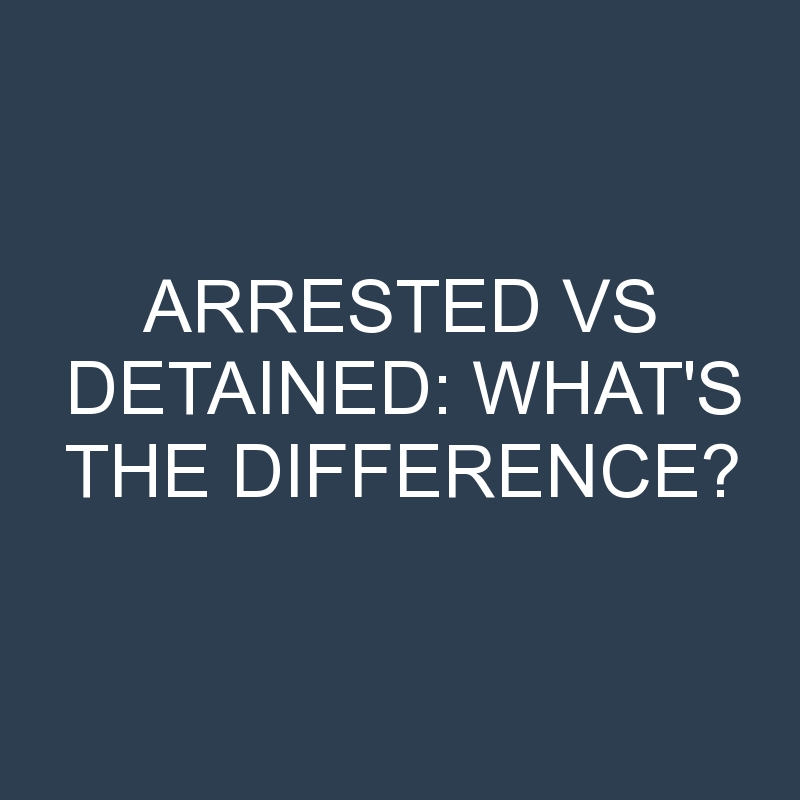Post Contents
Arrested Vs Detained: What’s the Difference?
When you hear the word “arrest,” what comes to mind? Maybe you think of someone being led away in handcuffs, or perhaps you picture a person being read their Miranda rights. In either case, you probably think of someone who has been taken into police custody.
But what about the word “detain?” What does that mean?
Interestingly, the two words are often used interchangeably, even though they actually have different meanings. So what is the difference between being arrested and being detained?
What is an arrest?
An arrest is an act of detaining a person by legal authority. An arrest can be made by a law enforcement officer or by a private citizen. When a law enforcement officer makes an arrest, the officer must have probable cause to believe that the person has committed a crime.
Probable cause is defined as a reasonable belief that a crime has been committed. Once a person is under arrest, the officer must read the Miranda warnings to the person. The Miranda warnings advise the person of his or her right to remain silent and the right to have an attorney present during questioning.
What does it mean to be detained?
When most people hear the word “detained,” they think of being held against one’s will in a prison or other type of facility.
However, detention can also refer to simply being held for questioning by law enforcement. If you are detained, it means that a police officer has reasonable suspicion to believe that you have committed a crime and is holding you in order to question you about it.
You are not under arrest at this point, and you are not considered a suspect. You may be released after questioning if the officer does not have enough evidence to arrest you.
The difference between an arrest and detention
An arrest is when the police take you into custody and charge you with a crime. Detention is when the police hold you for questioning without charging you with a crime.
When can the police detain someone?
The police can detain someone if they have a reasonable suspicion that the person has committed, is committing, or is about to commit a crime. The police can also detain someone if they have a warrant for the person’s arrest.
What rights do you have when you are detained?
When you are detained by the police, you have the right to remain silent and to have an attorney present during questioning.
You also have the right to be informed of the charges against you and to have a bail hearing. If you are arrested, you give up some of these rights, but you still have the right to remain silent and to have an attorney present during questioning.
Are there any exceptions to being arrested or detained?
Yes, there are a few exceptions to being arrested or detained. If you are under the age of 18, you may be taken into custody without being formally arrested.
This is known as being “detained.” You may also be detained if the police believe you are a danger to yourself or others, or if they need to prevent you from fleeing the scene of a crime.
Pros and cons of each
There are a few key differences between being arrested and being detained by the police. First, let’s look at the pros and cons of each option.
Being arrested means that you are taken into custody and charged with a crime. This gives you the right to an attorney and to a fair trial. However, it also means that you will likely have to post bail and may spend time in jail before your trial.
Being detained, on the other hand, simply means that you are being held by the police for questioning. You are not under arrest and you are not considered a suspect. However, you may still be searched and questioned without an attorney present.
So, which is better? That really depends on your situation. If you are innocent of any crime, then being arrested may be the best option as it will give you more legal protection.
But if you are suspected of a crime, then being detained may be preferable as it allows the police to question you without an attorney present.
When to contact a lawyer
If you are arrested or detained by the police, it is important to know when to contact a lawyer. Depending on the situation, you may want to contact a lawyer right away or wait until you have been released from custody.
If you are arrested, you have the right to remain silent and to have an attorney present during questioning. You should exercise these rights as soon as possible. Contacting a lawyer as soon as possible will help ensure that your rights are protected.
If you are detained, you may not have the same rights as someone who has been arrested. For example, you may not have the right to remain silent or to have an attorney present during questioning. However, it is still a good idea to contact a lawyer as soon as possible so that they can advise you of your rights and help protect your interests.
Conclusion
It’s important to know the difference between being arrested and being detained, as the consequences of each can be very different. If you are arrested, it means that the police believe that you have committed a crime and you will likely be taken into custody.
If you are detained, it means that the police have a reasonable suspicion that you have committed a crime and they may hold you for questioning. In both cases, it is important to remain calm and polite and to ask for a lawyer if you are unsure of your rights.
